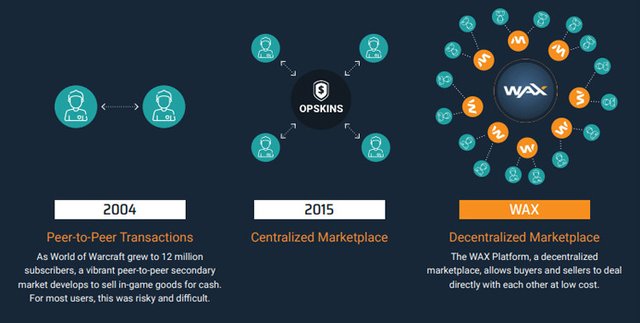WAX’s Malcolm CasSelle on building the ultimate game item marketplace on the blockchain
When it comes to retrospectively fitting blockchain to an existing product, there are few more dynamic transitions than that being implemented by WAX.
Created by the team behind secondary game item marketplace OPSkins, WAX – formally the Worldwide Asset eXchange – is nothing less than the attempt to take the centralized OPSkins marketplace and fully decentralize it.
Indeed, WAX plans to provide the technology to enable anyone to set up their own secondary game item marketplace, significantly expanding what’s already estimated to be a $5 to $50 billion market in terms of annual transaction volume.
“I want WAX to create tens of thousands of mini-OPSkins,” explains president Malcolm CasSelle.
“This is a marketplace-as-a-service, enabling everyone to have their own Amazon.”
Supercharging demand
As OPSkins’ current situation with Valve’s Steam PC game store highlights, the history of secondary item stores is something of a grey area.
Game developers view them as little better than software piracy writ small, creaming off cash that’s rightfully theirs. But as demonstrated by OPSkins’ incredibly high ranking on Trustpilot, users love the opportunity it provides when it comes to buying and cashing in skins.
What is certain, however, is whether or not formal secondary markets exist, players will find the ways and means to trade in-game items, EULAs or no EULAs.
And it’s this inherent demand that will drive the WAX ecosystem. Of course, bringing such marketplaces to the blockchain – and plenty of other existing companies like Gameflip, GamerToken and Dmarket are also active in this space – adds transparency and faster and more flexible transactions and cash-out options.
Hence, it could be argued that if the existing users of services such as OPSkins don’t adopt blockchain item marketplaces like WAX, the entire blockchain games sector is going to have to rethink its approach.

As for CasSelle, he’s bullish about the entire project.
“Over the years we’ve had so many companies approaching us to white label OPSkins,” he says.
“In that respect, WAX is the ultimate affiliate service and we have a long list of customers ready to use it when it’s available.”
Pushing at an open door
WAX is currently being implemented and tested in modular fashion within OPSkins, supporting the trading of items from blockchain games such as CryptoKitties. Given the low transaction volume currently generated by such games, it’s hardly a great test.
CasSelle says there are plans afoot for WAX to launch its own non-fungible token to stress test the technology as well as to see how attractive such collectables are to existing OPSkins traders.
More generally, a recent survey suggests a broad overlap between OPSkins users and cryptocurrency holders.
“We were shocked: 55% of millennials in the survey already had crypto,” CasSelle says.
However for the widespread adoption of WAX, he believes the fact it’s a blockchain project powered by its own WAX token should be invisible to users.
“The desire to buy ‘that item’ using a service that is fast, cheap and immediate and in a way that delivers value will be the key,” he explains. “Not what blockchain it runs on.”
Interestingly, the introduction of the new ExpressTrade instantaneous exchange protocol within the current version of OPSkins for non-blockchain game items such as Counter-Strike: Global Offensive skins (a key element of Valve’s beef with OPSkins) already demonstrates the speed at which WAX modules are being deployed.
The wider WAX protocol is somewhat dependent on the deployment and robustness of the underlying EOS blockchain from which it’s forked.
Yet despite some initial issues arising from EOS’ launch, CasSelle says WAX’s blockchain will be live on a testnet “very soon”.
Games drive demand
Perhaps the biggest issue will be how quickly the wider game industry adopts blockchain, though.
Just as OPSkins’ success has piggybacked the popularity of key PC games like CS: GO and Dota 2, so WAX’s trajectory will be dependent on bigger successes than CryptoKitties.
“Our job is to build a portfolio of blockchain games,” CasSelle agrees, saying that’s something he expects to come from what we can now consider the traditional games industry.
“It is happening. At GDC 2017, I was very lonely. No-one would take a meeting. At GDC 2018, my phone ran out of battery,” he adds.
“At least 10 of the top 50 game companies are considering blockchain. Triple-A games are now considering tradable items.
“The CFOs at these company don’t like it. They are justifiably cautious. But development is going ahead.”